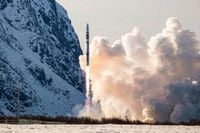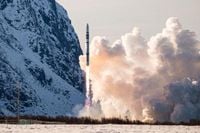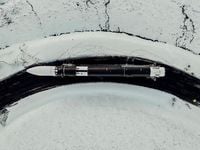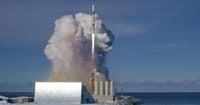In a groundbreaking moment for European space exploration, Isar Aerospace launched its Spectrum rocket from Norway's Andøya Spaceport on March 30, 2025. This event marks a significant milestone as it represents the first orbital rocket launch from continental Europe, excluding Russia, and is the first to be financed almost entirely by the private sector.
The Spectrum, a two-stage rocket measuring 28 meters long and 2 meters in diameter, is specifically designed to carry small to medium satellites into orbit. The rocket lifted off at 12:30 PM local time (10:30 GMT) but crashed into the sea just 30 seconds after launch, creating a fiery explosion that was broadcast live on YouTube.
Despite the short duration of the flight, Isar Aerospace described the launch as a success. "Our first test flight met all our expectations, achieving a great success. We had a clean liftoff, 30 seconds of flight and even got to validate our Flight Termination System," said Daniel Metzler, co-founder and CEO of Isar Aerospace. The company had previously indicated that it did not expect to reach orbit during this initial attempt, focusing instead on gathering data and experience for future missions.
Founded in 2018 in Munich, Isar Aerospace has quickly emerged as a key player in the European space startup scene, securing over 400 million euros in funding. The company aims to provide Europe with independent access to space, a need that has grown since the continent's reliance on Russian space capabilities has been severely hampered due to geopolitical tensions.
In recent years, Europe has faced significant challenges in its space sector, including delays in the development of the Ariane 6 rocket and the suspension of the Vega-C satellite launcher following an accident. The launch of the Spectrum rocket represents a potential turning point for European space capabilities, especially as the continent seeks to establish a more robust and independent space economy.
The Spectrum rocket is powered by ten Aquila engines that utilize a mixture of liquid propane and liquid oxygen, with a maximum payload capacity of approximately 1,000 kilograms for sun-synchronous orbits. The rocket's design reflects a shift towards more efficient and cost-effective launch solutions, positioning Isar Aerospace as a competitive alternative to established players such as SpaceX and Rocket Lab.
Following the launch, the Norwegian public firm Andoya Space, which operates the spaceport, confirmed that crisis response measures were activated but reported no injuries or damage beyond the rocket itself. The launch pad was described as intact, allowing for future launch attempts.
In a statement, Isar Aerospace emphasized that the data collected during the brief flight would be invaluable for improving subsequent missions. "Today is an important day for German and European space travel," noted German Economy Minister Robert Habeck. "Isar Aerospace can and will make a decisive contribution to securing Europe's independent access to space."
The launch was initially scheduled for March 24 but was postponed due to unfavorable wind conditions. A second attempt on March 29 was also scrapped because of adverse weather, leading to the eventual launch on March 30. This series of delays underscores the challenges faced by aerospace companies in achieving reliable launch schedules.
As Europe continues to navigate its space ambitions amid shifting geopolitical landscapes, the success of Isar Aerospace could pave the way for future advancements in the sector. The company has plans for up to 40 rocket launches annually, aiming to establish a sustainable and competitive presence in the global space market.
Isar Aerospace's efforts are part of a broader trend in the European space industry, where private companies are beginning to play a more prominent role. This movement, often referred to as "New Space," aims to harness private investment and innovation to complement traditional governmental space programs.
In parallel with Isar Aerospace's developments, several other European startups, including Germany's HyImpulse and Rocket Factory Augsburg, as well as French firms Latitude and MaiaSpace, are also vying to establish themselves in the burgeoning commercial space sector.
The launch of the Spectrum rocket, despite its premature termination, represents a critical step forward for Europe as it seeks to regain its footing in the space race. With the successful validation of its systems and the collection of extensive flight data, Isar Aerospace is poised to make significant contributions to the future of European space exploration.
As the dust settles from this historic launch, the focus now shifts to the lessons learned and how they will inform the next steps for Isar Aerospace and the broader European space community. The company remains committed to its mission of providing reliable and efficient access to space, and with continued support and investment, the future looks bright for European aerospace.








